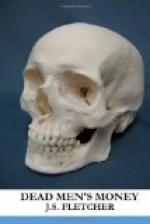“Half-past eleven,” replied Murray.
“Then, according to what you tell me, she left Hathercleugh soon after you telephoned to her?” said Mr. Lindsey.
“According to what the butler told us this morning,” answered Murray, “Lady Carstairs went out on her bicycle at exactly noon yesterday—and she’s never been seen or heard of since.”
“She left no message at the house?” asked Mr. Lindsey.
“None! And,” added the superintendent, significantly, “she didn’t mention to the butler that I’d just telephoned to her. It’s a queer business, this, I’m thinking, Mr. Lindsey. But—what’s your own news?—and what’s Moneylaws got to tell about Sir Gilbert?”
Mr. Lindsey took no notice of the last question. He sat in silence for a while, evidently thinking. And in the end he pointed to some telegram forms that lay on the superintendent’s desk.
“There’s one thing must be done at once, Murray,” he said; “and I’ll take the responsibility of doing it myself. We must communicate with the Carstairs family solicitors.”
“I’d have done it, as soon as the butler brought me the news about Lady Carstairs,” remarked Murray, “but I don’t know who they are.”
“I do!” answered Mr. Lindsey. “Holmshaw and Portlethorpe of Newcastle. Here,” he went on, passing a telegram form to me. “Write out this message: ’Sir Gilbert and Lady Carstairs are both missing from Hathercleugh under strange circumstances please send some authorized person here at once.’ Sign that with my name, Hugh—and take it to the post-office, and come back here.”
When I got back, Mr. Lindsey had evidently told Murray and Chisholm all about my adventures with Sir Gilbert, and the two men regarded me with a new interest as if I had suddenly become a person of the first importance. And the superintendent at once fell upon me for my reticence.
“You made a bad mistake, young man, in keeping back what you ought to have told at the inquest on Phillips!” he said, reprovingly. “Indeed, you ought to have told it before that—you should have told us.”
“Aye!—if I’d only known as much as that,” began Chisholm, “I’d have—”
“You’d probably have done just what he did!” broke in Mr. Lindsey—“held your tongue till you knew more!—so let that pass—the lad did what he thought was for the best. You never suspected Sir Gilbert of any share in these affairs, either of you—so come, now!”
“Why, as to that, Mr. Lindsey,” remarked Murray, who looked somewhat nettled by this last passage, “you didn’t suspect him yourself—or, if you did, you kept it uncommonly quiet!”
“Does Mr. Lindsey suspect him now?” asked Chisholm, a bit maliciously. “For if he does, maybe he’ll give us a hand.”
Mr. Lindsey looked at both of them in a way that he had of looking at people of whose abilities he had no very great idea—but there was some indulgence in the look on this occasion.




